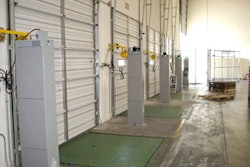Sunnyvale, CA — November 19, 2007 — With crude oil prices soaring to $100 per barrel, many companies — especially those affected by transportation — are worried about the impact it may have on their business in both the short and long-term. To help them cope, spend management specialist Ariba has issued guidance on how global organizations can offset rising fuel prices and continue to compete in a lean economy.
"Rising fuel costs are a fact of doing business, not just today, but always," said Pat Furey, senior category manager with Ariba. "Organizations must accept the dynamic nature of fuel as a long-term reality and seek opportunities for savings elsewhere to minimize the impact fuel costs have on their bottom line. The guidance we are issuing today offers a best-practice approach that oil-dependent organizations can take to stabilize their business and remain competitive amid drastic fluctuations in fuel prices."
To help organizations offset the rising cost of fuel, Ariba offers the following recommendations:
1. Accept the reality. Fuel is a commodity that is in a constant state of flux and there is little you can do to set or control pricing.
2. Look for savings elsewhere. While you may not be able to combat rising gas prices directly, you can offset the unpredictable dynamic by driving cost reductions in non-affected categories of spend such as temporary labor, IT and legal services, print marketing, etc.
3. Don't give up on competitive sourcing. Just because you can't competitively bid fuel, don't abandon your strategic sourcing efforts. You may find opportunities for savings in the non-fuel components of your contracts. For instance, if you're buying a service that includes a fuel surcharge, break the charge out separately, tie it to an index that allows for fluctuation and then bid the rest of the cost of the service.
4. Actively manage your spend. You may be able to reduce commodity costs 5-15 percent by, among other things, increasing the frequency of sourcing events, leveraging tools that provide clear visibility into enterprise-wide spending and streamlining the accounts payable process to reduce invoicing over-charges. These savings will help offset rising energy-related costs.
5. Collaborate with suppliers. Work with your service providers to gain a better understanding of how rising fuel prices are impacting their cost structures. Acting in good faith to share the burden of price increases can open opportunities to restructure contracts in an equitable manner and maintain long-term, mutually beneficial relationships.
6. Know your contracts. Careful review of contract terms may unlock potential savings opportunities that can positively impact your bottom line. If a service requires travel, consider implementing a buyer-dictated fuel surcharge program that standardizes the price of fuel and requires suppliers to focus on the cost of their core service.
7. Watch the markets. Constantly monitor key indices and market developments so that you can proactively manage the impact of any changes on your contracts and reevaluate them as appropriate rather than reacting to them.
8. Forget the silver bullet. There is no quick fix solution for managing rising commodity prices. Effectively combating their negative impact requires a sustained commitment to strategic sourcing on an enterprise-wide, global basis.
"There certainly isn't a magic potion for dealing with volatile commodity markets," Furey said. "But by implementing sound sourcing strategies and sticking to them, companies can mitigate their risk and lessen potentially negative effects on their businesses."
Ariba provides an array of technology, expertise and services to help companies across industries manage their spend. The solution provider has a customer base of more than 600 companies.
"Rising fuel costs are a fact of doing business, not just today, but always," said Pat Furey, senior category manager with Ariba. "Organizations must accept the dynamic nature of fuel as a long-term reality and seek opportunities for savings elsewhere to minimize the impact fuel costs have on their bottom line. The guidance we are issuing today offers a best-practice approach that oil-dependent organizations can take to stabilize their business and remain competitive amid drastic fluctuations in fuel prices."
To help organizations offset the rising cost of fuel, Ariba offers the following recommendations:
1. Accept the reality. Fuel is a commodity that is in a constant state of flux and there is little you can do to set or control pricing.
2. Look for savings elsewhere. While you may not be able to combat rising gas prices directly, you can offset the unpredictable dynamic by driving cost reductions in non-affected categories of spend such as temporary labor, IT and legal services, print marketing, etc.
3. Don't give up on competitive sourcing. Just because you can't competitively bid fuel, don't abandon your strategic sourcing efforts. You may find opportunities for savings in the non-fuel components of your contracts. For instance, if you're buying a service that includes a fuel surcharge, break the charge out separately, tie it to an index that allows for fluctuation and then bid the rest of the cost of the service.
4. Actively manage your spend. You may be able to reduce commodity costs 5-15 percent by, among other things, increasing the frequency of sourcing events, leveraging tools that provide clear visibility into enterprise-wide spending and streamlining the accounts payable process to reduce invoicing over-charges. These savings will help offset rising energy-related costs.
5. Collaborate with suppliers. Work with your service providers to gain a better understanding of how rising fuel prices are impacting their cost structures. Acting in good faith to share the burden of price increases can open opportunities to restructure contracts in an equitable manner and maintain long-term, mutually beneficial relationships.
6. Know your contracts. Careful review of contract terms may unlock potential savings opportunities that can positively impact your bottom line. If a service requires travel, consider implementing a buyer-dictated fuel surcharge program that standardizes the price of fuel and requires suppliers to focus on the cost of their core service.
7. Watch the markets. Constantly monitor key indices and market developments so that you can proactively manage the impact of any changes on your contracts and reevaluate them as appropriate rather than reacting to them.
8. Forget the silver bullet. There is no quick fix solution for managing rising commodity prices. Effectively combating their negative impact requires a sustained commitment to strategic sourcing on an enterprise-wide, global basis.
"There certainly isn't a magic potion for dealing with volatile commodity markets," Furey said. "But by implementing sound sourcing strategies and sticking to them, companies can mitigate their risk and lessen potentially negative effects on their businesses."
Ariba provides an array of technology, expertise and services to help companies across industries manage their spend. The solution provider has a customer base of more than 600 companies.


















